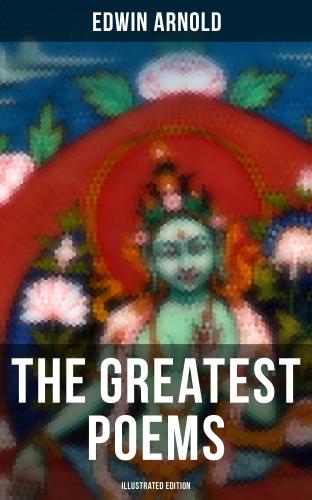Were the four Regents of the Earth, come down
From Mount Sumeru—they who write men's deeds
On brazen plates—the Angel of the East,
Whose hosts are clad in silver robes, and bear
Targets of pearl: the Angel of the South,
Whose horsemen, the Kumbhandas, ride blue steeds,
With sapphire shields: the Angel of the West,
By Nagas followed, riding steeds blood-red,
With coral shields: the Angel of the North,
Environed by his Yakshas, all in gold,
On yellow horses, bearing shields of gold.
These, with their pomp invisible, came down
And took the poles, in caste and outward garb
Like bearers, yet most mighty gods; and gods
Walked free with men that day, though men knew not
For Heaven was filled with gladness for Earth's sake,
Knowing Lord Buddha thus was come again.
But King Suddhodana wist not of this;
The portents troubled, till his dream-readers
Augured a Prince of earthly dominance,
A Chakravartin, such as rise to rule
Once in each thousand years; seven gifts he has
The Chakra-ratna, disc divine; the gem;
The horse, the Aswa-ratna, that proud steed
Which tramps the clouds; a snow-white elephant,
The Hasti-ratna, born to bear his King;
The crafty Minister, the General
Unconquered, and the wife of peerless grace,
The Istri-ratna, lovelier than the Dawn.
For which gifts looking with this wondrous boy,
The King gave order that his town should keep
High festival; therefore the ways were swept,
Rose-odours sprinkled in the street, the trees
Were hung with lamps and flags, while merry crowds
Gaped on the sword-players and posturers,
The jugglers, charmers, swingers, rope-walkers,
The nautch-girls in their spangled skirts and bells
That chime light laughter round their restless feet;
The masquers wrapped in skins of bear and deer.
The tiger-tamers, wrestlers, quail-fighters,
Beaters of drum and twanglers of the wire,
Who made the people happy by command.
Moreover from afar came merchant-men,
Bringing, on tidings of this birth, rich gifts
In golden trays; goat-shawls, and nard and jade,
Turkises, "evening-sky" tint, woven webs—
So fine twelve folds hide not a modest face—
Waist-cloths sewn thick with pearls, and sandalwood;
Homage from tribute cities; so they called
Their Prince Svarthasiddh, "All-Prospering,"
Briefer, Siddartha.
'Mongst the strangers came
A grey-haired saint, Asita, one whose ears,
Long closed to earthly things, caught heavenly sounds,
And heard at prayer beneath his peepul-tree
The Devas singing songs at Buddha's birth.
Wondrous in lore he was by age and fasts;
Him, drawing nigh, seeming so reverend,
The King saluted, and Queen Maya made
To lay her babe before such holy feet;
But when he saw the Prince the old man cried
"Ah, Queen, not so!" and thereupon he touched
Eight times the dust, laid his waste visage there,
Saying, "O Babe! I worship! Thou art He!
I see the rosy light, the foot-sole marks,
The soft curled tendril of the Swastika,
The sacred primal signs thirty and two,
The eighty lesser tokens. Thou art Buddh,
And thou wilt preach the Law and save all flesh
Who learn the Law, though I shall never hear,
Dying too soon, who lately longed to die;
Howbeit I have seen Thee. Know, O King!
This is that Blossom on our human tree
Which opens once in many myriad years—
But opened, fills the world with Wisdom's scent
And Love's dropped honey; from thy royal root
A Heavenly Lotus springs: Ah, happy House!
Yet not all-happy, for a sword must pierce
Thy bowels for this boy—whilst thou, sweet Queen!
Dear to all gods and men for this great birth,
Henceforth art grown too sacred for more woe,
And life is woe, therefore in seven days
Painless thou shalt attain the close of pain."
Which fell: for on the seventh evening
Queen Maya smiling slept, and waked no more,
Passing content to Trayastrinshas-Heaven,
Where countless Devas worship her and wait
Attendant on that radiant Motherhead.
But for the Babe they found a foster-nurse,
Princess Mahaprajapati—her breast
Nourished with noble milk the lips of
Him Whose lips comfort the Worlds.
When th' eighth year passed
The careful King bethought to teach his son
All that a Prince should learn, for still he shunned
The too vast presage of those miracles,
The glories and the sufferings of a Buddh.
So, in full council of his Ministers,
"Who is the wisest man, great sirs," he asked,
"To teach my Prince that which a Prince should know?"
Whereto gave answer each with instant voice
"King! Viswamitra is the wisest one,
The farthest-seen in Scriptures, and the best
In learning, and the manual arts, and all."
Thus Viswamitra came and heard commands;
And, on a day found fortunate, the Prince
Took up his slate of ox-red sandal-wood,
All-beautified by gems around the rim,
And sprinkled smooth with dust of emery,
These took he, and
